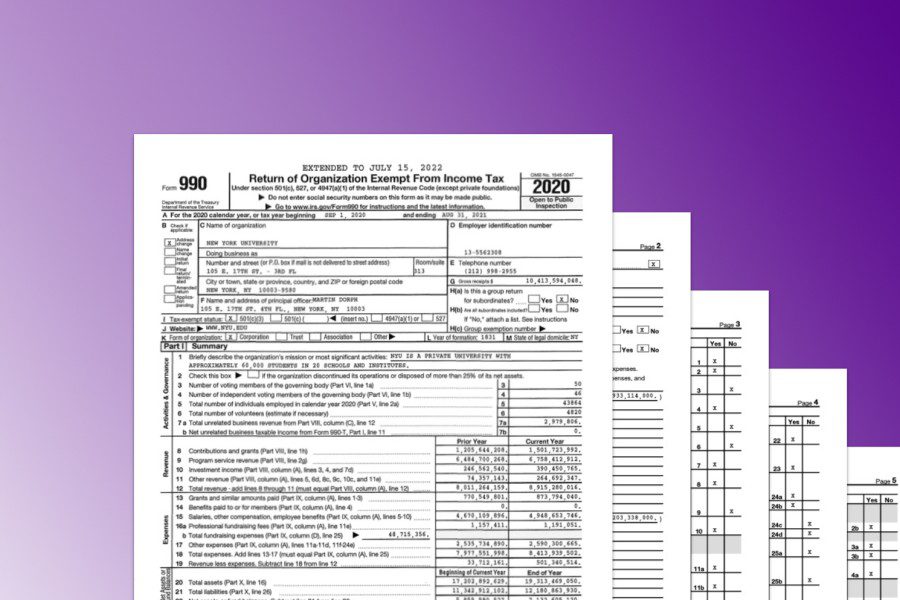As businesses nationwide struggled to stay afloat at the height of the pandemic, NYU’s income did too — revenue from the housing and dining services it provides decreased by 51% between the 2018-19 and 2020-21 academic years. The drop was, in part, due to two semesters of primarily virtual learning, and increased expenditure on health and safety measures enacted in response to COVID-19. But in the same period, the university’s total income rose by 13% — nearly $1.2 billion.
NYU raised its tuition by 2.95% for the 2020-21 period, with tuition and fees making up about 35% of the university’s revenue. The biggest contributors to the university’s $8,915,280,016 in revenue for that year were tuition and fees, patient care, and contributions and grants, which all rose from the previous year. At the time, some students criticized the tuition increase due to widespread economic difficulties during the pandemic.
The university is required to declare its financial status annually by filing Form 990, a federal disclosure for nonprofits that details how an organization spends and earns its money, pays its employees, and more. NYU’s most recent disclosure, released this year, covers the 2020-21 academic year, which marked the university’s gradual return to on-campus instruction after its operations were moved online due to the pandemic.
In March of 2020, NYU announced that it would move to remote instruction at the start of the pandemic. In a statement from President Andrew Hamilton, students were instructed to leave university housing by March 22. They were not allowed to return to campus for the remainder of the spring 2020 semester.
NYU granted refunds for on-campus dorming and dining costs for the remainder of that semester, and revenue for the 2019-20 school year from housing and meal plans dropped by more than $100 million compared to the previous year.
In an April 2020 email, university administrators said that NYU’s financial losses due to the pandemic were the greatest since the university sold its Bronx campus to avoid insolvency in 1973.
The email also disclosed that NYU had lost around $100 million in the spring 2020 semester and was expected to lose another $150 million in the following summer term. At the time the email was sent, the university had spent $60 million on housing and meal plan refunds, $4 million on emergency aid and $3 million on financial assistance to students studying abroad.
During the 2020-21 academic year, some instruction on campus resumed, but with new restrictions for students living in NYU housing. No guests, including those who live in the same building, were allowed in dorm rooms, and some students opted to take classes remotely. Housing and meal plan revenue dropped by almost $70 million between the 2019-20 to 2020-21 academic years — a smaller decrease than the preceding period.
NYU received more than $130 million as a result of three acts passed by the federal government between 2020 and 2021 to mitigate the effects of the pandemic on colleges and universities. The acts created Higher Education Emergency Relief Funds I, II and III, which were meant to provide relief to both individual students and universities.
NYU split its HEERF funds between student grants and institutional support, with 45% allotted to students in need and 55% to NYU. From its institutional grant, the university allocated $37 million to housing and tuition refunds, and spent the remaining $33 million on replacing lost funds and monitoring COVID-19.
HEERF I required that at least 50% of the pandemic relief funds given to the university be used for emergency financial aid grants for students. NYU used exactly half of the funds it was given for student aid and the other half for institutional funding, although some student groups had called for all of the funding to be put into aid.
Many New York-area universities — including Columbia University and Fordham University — saw an increase in revenue similar to NYU. The two universities gained $389 million and $2 million in revenue, respectively. However, Barnard College’s revenue dropped by $70 million between 2019 and 2020, and The New School’s revenue decreased by almost $4 million.
Contact Carmo Moniz and Tori Morales at [email protected].


























































































































































